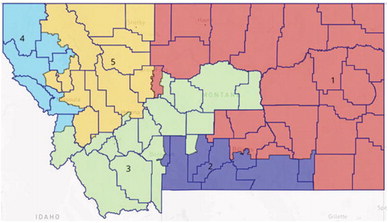New PSC Districts Bill Heads To Governor


A bill is headed to Republican Gov. Greg Gianforte’s desk that redraws the Public Service Commission district lines in a matter that Democrats have criticized as unfairly balancing them to favor Republicans.
The House voted 65-32 on Monday, April 17, to pass Sen. Keith Regier’s Senate Bill 109 on third reading – its final hurdle before going to the governor’s desk. Rep. Jennifer Carlson, R-Churchill, joined Democrats in voting against the bill.
The legislature has the authority to draw new district lines for the PSC, which regulates utility monopolies in Montana. Both Regier, R-Kalispell, and Rep. Steven Galloway, R-Great Falls, who is carrying the bill in the House, said during the bill’s second reading that it was the legislature’s duty to draw a new map this session following last year’s legislative redistricting and the fact that a judicial panel had to approve a new map last spring for last November’s election.
Both said the map proposed by the legislature through Regier’s bill would keep populations equal through all five districts and make them competitive. The five commission districts would be composed of various House districts.
Galloway said the map drawn by the secretary of state and approved by judges last year, the first new map since 2003, contains a District 4 that is still overpopulated by 4 percent, and the map proposed by Regier “makes it easier to get the equal population that the U.S. Constitution calls for.”
“There are 100 House seats. There are five commissioner positions. So, there it is: 20 house districts for each PSC district that makes the population as equal as the redistricting committee achieved,” Galloway said.
He said lawmakers should support the measure because the map from Republicans would prevent the districts from being overpopulated in the next 10 years, and the bill allows the legislature to have census data before adjusting PSC district boundaries.
Throughout the bill’s process through the legislature, Democrats, and some Senate Republicans, criticized it because it splits up every major city – which generally lean more Democratic – other than Butte and puts them in different districts. Republicans have retorted by saying that cities having multiple commissioners representing them should be beneficial.
On Friday, April 14, Democrats attempted to pass two amendments to the bill, though Republicans killed both.
Minority Leader Kim Abbott, D-Helena, proposed a map that split three counties and one city, which she said also had less population deviation than the map proposed by Regier. She said it would create more competitive districts “that a Democrat might be able to win if they run a good campaign.”
“If we’re going to do it this way, let’s have competitive districts. Let’s split as few counties and cities as we can, since that’s what we heard so much during the process was important,” she said.
Abbott’s amendment was opposed by Galloway and several other Republican lawmakers, including Speaker Matt Regier, R-Kalispell. Regier said he believed Abbott’s proposed map would be “out of whack” population- wise over the next 10 years because of the outsized growth in Montana’s largest cities.
Republicans John Fitzpatrick, R-Anaconda; Tony Brockman, R-Kalispell; Jodee Etchart, R-Billings; and Courtenay Sprunger, R-Kalispell, voted in favor of the amendment along with all Democrats except for Rep. Kelly Kortum, D-Bozeman, who voted against it. The amendment failed 35-65. Rep. Jonathan Karlen, D-Missoula, also brought an amendment, which he said built off the same idea that Regier and Galloway touted – that the larger cities should have at least two commissioners if that would benefit them.
Karlen’s proposed map followed legislative district lines and split all seven of Montana’s largest cities, including Butte, so they were each represented by at least two commissioners. He said his amendment would have also created populations in each district more equal than SB109 as written.
“If it advantages cities to split them into multiple districts and this body supports that concept, I think it’s really important that Butte is treated the same as Kalispell and Helena, that Butte doesn’t have less representation than the rest of Montana’s seven largest cities,” Karlen told the House.
Galloway told the body to vote against the amendment, saying it had already been voted down in committee. The House voted the amendment down 31-69. House Minority Whip Derek Harvey, D-Butte, said the House should reject Regier’s proposal because committee lawmakers did not get any answers as to the metric used aside from legislative districts and population equity. He said the measure was “getting thrown through” the process with “hardly any explanation on why it’s done.”
“You guys are pushing it through. I believe the citizens of the state of Montana deserve to know how this map was drawn and why it was drawn the way that it is,” Harvey said. “If you feel comfortable going home and telling your constituents that you approve this map, knowing that there’s roadblocks in the way for representation, go home and justify that to your constituents.”
Rep. Tom France, D-Missoula, said the bill and Galloway’s opening remarks on it were “an illustration how we can always find an argument to disguise or obscure blatant partisanship.” He said even on a bad day, 40 percent to 45 percent of Montanans vote for Democrats, and the map from Regier would result in a PSC making decisions that aren’t balanced and aren’t fair to anyone besides Republicans.
“I would ask, really though, that the party think about the damage that does to the Public Service Commission to have one party made up – and in some instances, it looks like a retirement home for Republican politicians – they do not get the diversity of views that is so important to good decision-making,” France said.
The current commission is made up of five Republicans.
Rep. Laurie Bishop, D-Livingston, said the map approved by the court last year was balanced and it was not necessary for the legislature to create a new one at this juncture. She, too, questioned why the legislature felt it needed to pass the measure, and said she felt it involved Republicans making a map that “just stacks the deck” in their favor.
Galloway tried to turn Democrats’ words against them, saying he found them ironic.
“I guess they’re saying that the redistricting committee that just did our redistricting gerrymandered because we’re following that [map]. That commission wasn’t good enough,” he said. “… What the constitution calls for is one person, one vote. That’s it. I find it ironic, because if you ask me, they’re making my case for me, and I appreciate that. Because this isn’t political – unless, of course, it was drawn politically previously. Because we’re just using those previous districts that were just redone.”
The House passed the bill 66-34 on second reading, as Reps. Casey Knudsen, R-Malta, and George Nikolakakos, R-Great Falls, voting against it. It passed 65-32 on third reading and is now in the final enrolling process. The bill will take effect immediately should it be signed by the governor.



